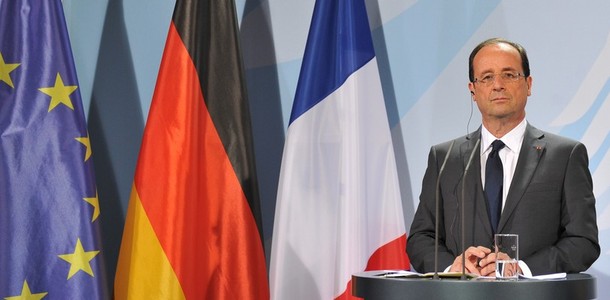
From Marcus Weisgerber and Pierre Tran, Defense News: François Hollande may have pledged on the campaign stump to pull France’s combat troops out of Afghanistan by the end of this year , but analysts expect the president-elect to do his utmost to reassure NATO allies that France is a solid partner when the alliance chiefs meet in Chicago later this month. . . .
Outgoing French President Nicolas Sarkozy surprised NATO allies when he said Jan. 20 that Paris would pull out combat troops by the end of 2013. A few days later, U.S. Defense Secretary Leon Panetta said he hoped Afghan forces would take the “combat lead” in 2013, but American forces would still be engaged in combat missions.
To differentiate himself during the campaign against Sarkozy, Hollande proposed that French combat units would leave one year earlier, said Loic Tribot la Spiere, chief executive of Paris think tank Centre d’Etude et Prospective Stratégique.
With the campaign over, analysts suggest that Hollande has given himself an escape route from his campaign pledge.
But Hollande also knows how important it is to maintain France’s standing in the alliance.
Socialist lawmaker Bernard Cazeneuve, a defense specialist and spokesman for Hollande’s campaign, said the French leader fully understands Paris is a member of an alliance and will “propose” an early withdrawal when he goes to Chicago. Indeed, Hollande is not one to slam his fist on the table, but will try to explain to the allies the sense of the French move, Tribot la Spiere said. . . .
“The principle which applies for the German government is: We entered [Afghanistan] together, we will leave together,” Chancellor Angela Merkel told German lawmakers May 10, Agence France-Presse reported.
Merkel’s remarks were widely seen as taking aim at Hollande ahead of the NATO summit, which begins May 20.
Individual nations should not organize redeployment plans “in isolation,” French Air Force Gen. Stéphane Abrial, who heads NATO’s U.S.-based Allied Transformation Command, said at a May 8 Defense Writers Group breakfast in Washington.
The Netherlands pulled its troops out of Afghanistan in 2010 and Canada ended combat operations last year, but keeps a training mission. . . .
Barry Pavel, director of the International Security Program and director-designate of the Brent Scowcroft Center on International Security at the Atlantic Council in Washington, said he is looking for three major components out of the Afghanistan discussions in Chicago.
Specifically, will the International Security Assistance Force be able to sustain the level of troops needed throughout the phased transition to Afghan forces in the coming years; what is the strategy after the transition in 2014 and beyond; and will NATO leaders be able to convince the public to support “residual military activities,” such as training and advising, beyond 2014, he said.
“[I]f I had to guess, we’d have what we call a [quick reaction force] somewhere in the region … that if all of a sudden there was just such an operational crisis that the Afghans couldn’t handle it themselves, the cavalry will come in and [provide] support,” Pavel said. “Whatever the missions are, they should be guided by a strategy, and our leaders need to lead to ensure that everybody follows that strategy until we are comfortable that we can reduce [troop levels] even further.”
That is a key issue for other European countries and the U.S. to decide: What will be the scope of NATO’s role in Afghanistan after ending combat operations and post-2014? (photo: Getty)
Image: getty%205%2015%2012%20Francois%20Hollande.jpg
